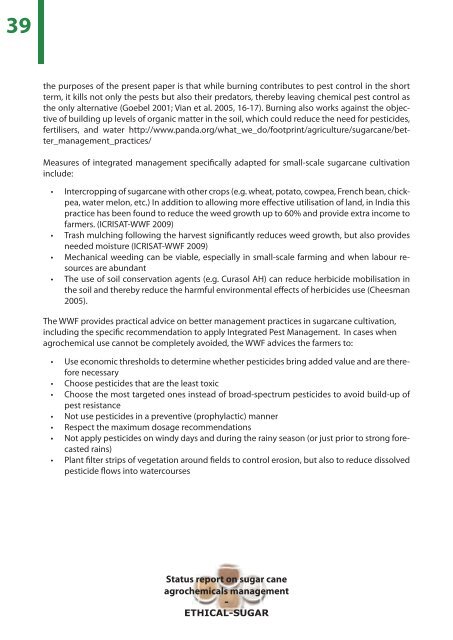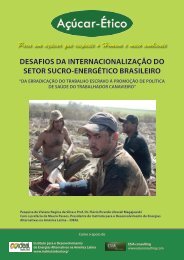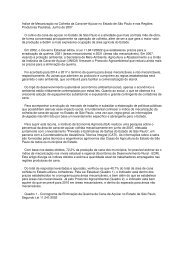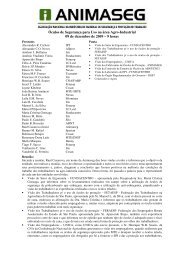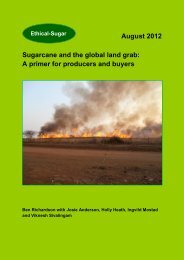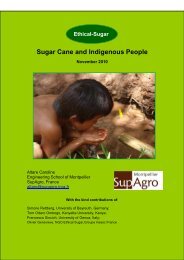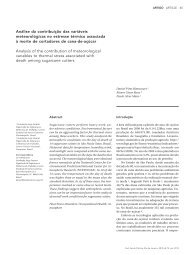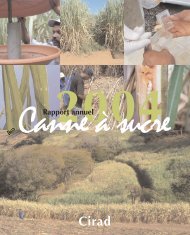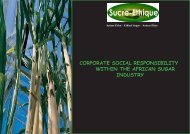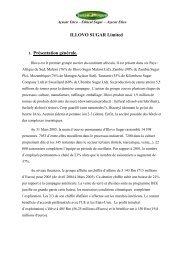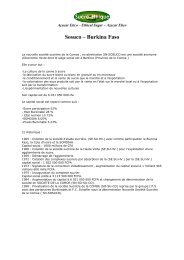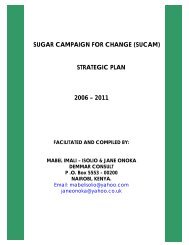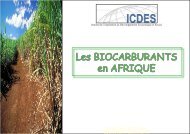Status report on sugar cane agrochemicals ... - Sucre Ethique
Status report on sugar cane agrochemicals ... - Sucre Ethique
Status report on sugar cane agrochemicals ... - Sucre Ethique
Create successful ePaper yourself
Turn your PDF publications into a flip-book with our unique Google optimized e-Paper software.
39<br />
the purposes of the present paper is that while burning c<strong>on</strong>tributes to pest c<strong>on</strong>trol in the short<br />
term, it kills not <strong>on</strong>ly the pests but also their predators, thereby leaving chemical pest c<strong>on</strong>trol as<br />
the <strong>on</strong>ly alternative (Goebel 2001; Vian et al. 2005, 16-17). Burning also works against the objective<br />
of building up levels of organic matter in the soil, which could reduce the need for pesticides,<br />
fertilisers, and water http://www.panda.org/what_we_do/footprint/agriculture/<strong>sugar</strong><strong>cane</strong>/better_management_practices/<br />
Measures of integrated management speci� cally adapted for small-scale <strong>sugar</strong><strong>cane</strong> cultivati<strong>on</strong><br />
include:<br />
• Intercropping of <strong>sugar</strong><strong>cane</strong> with other crops (e.g. wheat, potato, cowpea, French bean, chickpea,<br />
water mel<strong>on</strong>, etc.) In additi<strong>on</strong> to allowing more e� ective utilisati<strong>on</strong> of land, in India this<br />
practice has been found to reduce the weed growth up to 60% and provide extra income to<br />
farmers. (ICRISAT-WWF 2009)<br />
• Trash mulching following the harvest signi� cantly reduces weed growth, but also provides<br />
needed moisture (ICRISAT-WWF 2009)<br />
• Mechanical weeding can be viable, especially in small-scale farming and when labour resources<br />
are abundant<br />
• The use of soil c<strong>on</strong>servati<strong>on</strong> agents (e.g. Curasol AH) can reduce herbicide mobilisati<strong>on</strong> in<br />
the soil and thereby reduce the harmful envir<strong>on</strong>mental e� ects of herbicides use (Cheesman<br />
2005).<br />
The WWF provides practical advice <strong>on</strong> better management practices in <strong>sugar</strong><strong>cane</strong> cultivati<strong>on</strong>,<br />
including the speci� c recommendati<strong>on</strong> to apply Integrated Pest Management. In cases when<br />
agrochemical use cannot be completely avoided, the WWF advices the farmers to:<br />
• Use ec<strong>on</strong>omic thresholds to determine whether pesticides bring added value and are therefore<br />
necessary<br />
• Choose pesticides that are the least toxic<br />
• Choose the most targeted <strong>on</strong>es instead of broad-spectrum pesticides to avoid build-up of<br />
pest resistance<br />
• Not use pesticides in a preventive (prophylactic) manner<br />
• Respect the maximum dosage recommendati<strong>on</strong>s<br />
• Not apply pesticides <strong>on</strong> windy days and during the rainy seas<strong>on</strong> (or just prior to str<strong>on</strong>g forecasted<br />
rains)<br />
• Plant � lter strips of vegetati<strong>on</strong> around � elds to c<strong>on</strong>trol erosi<strong>on</strong>, but also to reduce dissolved<br />
pesticide � ows into watercourses<br />
<str<strong>on</strong>g>Status</str<strong>on</strong>g> <str<strong>on</strong>g>report</str<strong>on</strong>g> <strong>on</strong> <strong>sugar</strong> <strong>cane</strong><br />
<strong>agrochemicals</strong> management<br />
-<br />
ETHICAL-SUGAR


